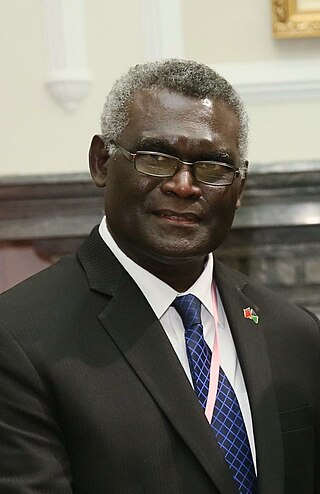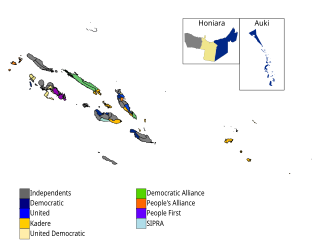
Politics of Solomon Islands takes place within the framework of a parliamentary representative democratic, constitutional monarchy. Solomon Islands is an independent Commonwealth realm, where executive power is exercised by the government. Legislative power is vested in both the government and a multi-party parliament.

Solomon Islands, also known simply as the Solomons, is a country consisting of 21 major islands Guadalcanal, Malaita, Makira, Santa Isabel, Choiseul, New Georgia, Kolombangara, Rennell, Vella Lavella, Vangunu, Nendo, Maramasike, Rendova, Shortland, San Jorge, Banie, Ranongga, Pavuvu, Nggela Pile and Nggela Sule, Tetepare, and over 900 smaller islands in Melanesia, part of Oceania, to the northeast of Australia. It is directly adjacent to Papua New Guinea to the west, Australia to the southwest, New Caledonia and Vanuatu to the southeast, Fiji, Wallis and Futuna, and Tuvalu to the east, and Nauru and the Federated States of Micronesia to the north. It has a total area of 28,896 square kilometres, and a population of 734,887 according to the official estimates for mid 2023. Its capital and largest city, Honiara, is located on the largest island, Guadalcanal. The country takes its name from the wider area of the Solomon Islands archipelago, which is a collection of Melanesian islands that also includes the Autonomous Region of Bougainville, but excludes the Santa Cruz Islands.

The governor-general of Solomon Islands is the representative of the Solomon Islands' monarch, currently King Charles III, in Solomon Islands. The governor-general is appointed by the monarch after their nomination by the National Parliament by vote. The functions of the governor-general include appointing ministers, judges, and ambassadors; giving royal assent to legislation passed by parliament; and issuing writs for election.

Solomon Islands elects a national legislature, known as the National Parliament of Solomon Islands, which has 50 members, elected for a four-year term in single-seat constituencies.

The Solomon Islands Liberal Party (SILP) was a political party in the Solomon Islands.

Manasseh Damukana Sogavare is a Solomon Islander politician serving as Minister of Finance since 2024. He served as the prime minister of Solomon Islands for a total of nine years from 2000–2001, 2006–2007, 2014–2017, and 2019–2024. Sogavare has served in the National Parliament representing East Choiseul since 1997.

General elections were held in the Solomon Islands on 5 April 2006. No party won more than four of the fifty seats, while thirty seats went to independent candidates. A number of those subsequently formed an Association of Independent Members of Parliament, with Snyder Rini as their leader. Rini was elected Prime Minister by Parliament on 18 April, amidst "widespread street protests" in Honiara, which caused particular damage in the city's Chinatown. Rioters "alleged corruption and insisted that Mr. Rini had been unfairly favouring Chinese businessmen". While the riots ceased with the arrival of Australian and New Zealand peacekeeping troops the next day, the opposition soon lodged a motion of no confidence in Rini's premiership. Rini resigned on 26 April, having been Prime Minister for just eight days. Opposition parties united in a coalition and succeeded in having Manasseh Sogavare, of the Solomon Islands Social Credit Party, elected Prime Minister on 4 May.

Honiara is the capital and largest city of Solomon Islands, situated on the northwestern coast of Guadalcanal. As of 2021, it had a population of 92,344 people. The city is served by Honiara International Airport and the seaport of Point Cruz, and lies along the Kukum Highway. In 1983, a Capital Territory – comprising the 22 square-kilometre metropolitan area of Honiara – was proclaimed, with a self-governing status akin to a province, although the city also retained an older role as capital of Guadalcanal Province.
East Honiara is a parliamentary constituency electing one representative to the National Parliament of Solomon Islands. With an electorate of 30,049 in 2006, it is by far the most heavily populated constituency in the country, being the only one to consist in more than 20,000 voters. It is one of three parliamentary constituencies in the country's capital city, Honiara - the other two being Central Honiara and West Honiara.
Aoke/Langalanga, also known as Auki/Langalanga, is a parliamentary constituency electing one representative to the National Parliament of Solomon Islands. It is one of fourteen constituencies in Malaita Province. It is also a relatively new constituency, having been established for the Fifth Parliament in 1993. It had an electorate of 7,365 in 2006.
North East Guadalcanal is a parliamentary constituency electing one representative to the National Parliament of Solomon Islands. It is one of eight constituencies in Guadalcanal Province. It had an electorate of 5,584 in 2006.

The Shadow Cabinet of Solomon Islands is the parliamentary Opposition's alternative Cabinet in Solomon Islands. Solomon Islands is a Commonwealth realm with a Westminster system of government; the Shadow Cabinet is modelled on the British institution of the same name.

General elections were held in the Solomon Islands on 24 October 1984. A total of 230 candidates contested the elections, the result of which was a victory for the Solomon Islands United Party, which won 13 of the 38 seats.

General elections were held in the Solomon Islands on 26 May 1993. A record total of 280 candidates contested the election, the result of which was a victory for the new SIGNUR party. However, it failed to achieve a majority in Parliament, and its leader, Solomon Mamaloni, was defeated in the election for Prime Minister by Francis Billy Hilly.

General elections were held in the Solomon Islands on 6 August 1997. A total of 350 candidates representing nine parties contested the election, the result of which was a victory for the Solomon Islands National Unity and Reconciliation Party (SINURP), which won 21 of the 50 seats. However, Bartholomew Ulufa'alu, leader of the Liberal Party, was elected Prime Minister by Parliament, defeating SINURP leader Solomon Mamaloni.

General elections were held in the Solomon Islands on 19 November 2014. Independent candidates won 32 of the 50 seats in the National Parliament, with the Democratic Alliance Party emerging as the largest party with seven seats.

General elections were held in the Solomon Islands in May and June 1970, the first to the new Governing Council. Most candidates ran as independents.

General elections were held in Solomon Islands on 3 April 2019 to determine the composition of the 11th Parliament. The election was the first to occur since the conclusion of the Regional Assistance Mission to the Solomon Islands (RAMSI) in 2017. Parliament passed amendments to the electoral act in 2018 that included the introduction of pre-polling, a significant increase in campaign budgets for candidates and stricter penalties for individuals committing electoral offences such as vote-buying. Ten of the thirteen parties that contested the election won seats, and the Solomon Islands Democratic Party and the Kadere Party were the parties that secured the highest amount, winning eight each. However, as in previous elections, independent candidates won the largest share of seats, securing 21.

Elections are held in Providence, Rhode Island to elect the city's mayor. Such elections are regularly scheduled to be held in United States midterm election years.







